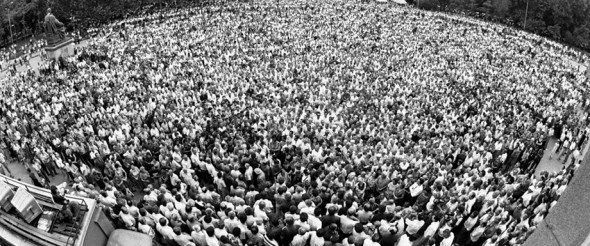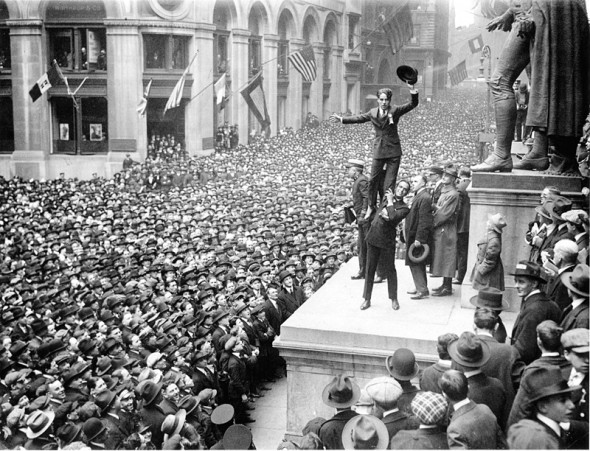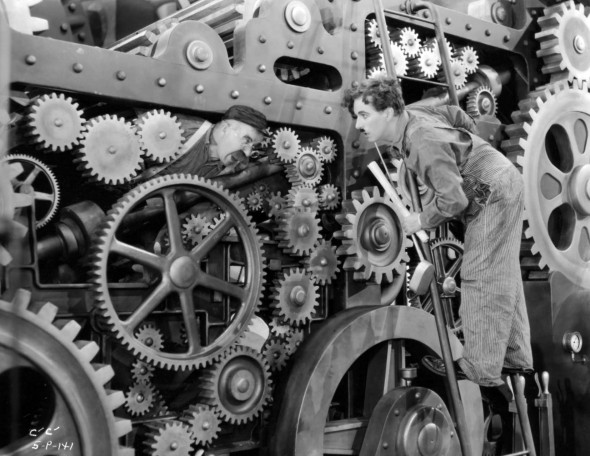My name is Armen Sargsyan. I am from Armenia, the country where Noah first time stepped down from his Ark. From my window in Yerevan, the capital city I every day see the mount Ararat, where it happened. I am journalist and script writer. I work at Media Initiatives center in my country. We promote freedom of expression and open media. We help in delivering media literacy ideas in Armenia and in the world. Additionally, I am involved in documentary and short film production as a tool to initiate dialogue between people and societies that are in conflicts.
The “Great Dictator” of leadership
This is the Opera square of the Armenian capital city Yerevan in 1988. People stand to protect their rights against the Soviet regime. The Soviet leaders were in their offices looking from the window and trying to understand what millions of people wanted. But the real leaders were in the square, among those millions.

A day before, they were workers, teachers and scientists; they were reborn as leaders within one night. They saw the “shadow of democracy” while the others were looking at the “ghost of communism.” What happened next? They became leaders of a small nation and took this nation trough war, hunger and calamities. On that path some of those leaders were killed in Nagorno Karabakh war, some of them became severe opponents on their half way, some of them were taken to prisons, some of them were terrorized half way into their trip. At the end of the day, they created the Liberty square out the Opera square and they founded the Republic of Armenia which was the dream of the Armenians more than 600 years. And that’s because – they were in the right place at the right time.

Now, what about those leaders who do not wait for the right time and place? What about those who just create their own time and space to act? Here is another square and people are here to greet the creator of “The Great Dictator” – Charles Chaplin. He is at the foot of President George Washington’s statue in front of the Sub-Treasury (now Federal Hall National Memorial) in New York. An admiring Wall Street throng was crammed shoulder to shoulder as far as the eye could see. The new leader is born on his friend’s shoulder. He came to say the words that were challenged until now.
“I hope we shall abolish war and settle all differences at the conference table… I hope we shall abolish all hydrogen and atom bombs before they abolish us first.” Charles Chaplin
His films were a great support to deliver his ideas to society and act as leader. In the film “Dictator” Charles Chaplin confronted with one of the world leaders – Adolf Hitler and he delivered his own messages to Hitler openly fighting with him in the stage of leadership:
“I’m sorry, but I don’t want to be an emperor. That’s not my business. I don’t want to rule or conquer anyone. I should like to help everyone if possible; Jew, Gentile, black man, white. We all want to help one another. Human beings are like that. We want to live by each other’s happiness, not by each other’s misery. We don’t want to hate and despise one another. In this world there is room for everyone, and the good earth is rich and can provide for everyone. The way of life can be free and beautiful, but we have lost the way.” Charles Chaplin
Why he was so brave? Why he was so confident? Why he was so strong in his way? These are questions the answers of which best describe a leader’s character. My answer to these “3 Why’s” is that he did not wait for a certain moment or he did not choose a certain place to spread his ideas – he created his own environment and he dated the people of the USA and the world every evening to meet him at the cinema.

- Charles Chaplin was brave because in his field, he was professional.
- He was confident because he always had means to measure the reaction: smiles, tears and applauses.
- He was strong because he took the right side, which is to change for the better.
The unique life of Chaplin, in his social and civic activism, made me to realize that leadership through professional development and success make a person stronger in deeds. It also turns the leadership into a gradually ascending process.
Edited by Emily Nichols, Writer, Bilingual Brand Consultant and Creative Leader

Hi Armen!
I love the speech from “The Great Dictator”! I’m glad you also appreciate it. It’s always been a huge source of inspiration from me, but until reading your blog I never really applied it to leadership. Chaplin truly does present himself as the ultimate idealistic leader. I hope one day such a vision will not be considered naive.
I really appreciated the short lesson on Yerevan’s 1988 movement. You wrote about it beautifully and I learned quite a bit! Revolutionaries are increasingly recognized as leaders (such as the Time Person of the Year a few years back), deservingly so. They demonstrate unity, teamwork, ambition and many other leadership qualities.
Hi Alex,
Thank you for the great comment. That pushed me to read Chaplin’s letters to his daughter Geraldine once more. Look what he’s writing in his age of 70: ”With this letter I am sending you a check book, so you could spend as much as you wish. But when waste two francs, do not forget to remind yourself that the third coin – not yours. It must belong to a stranger who needed it.”